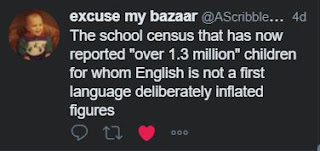Of course, a gender question was set on the 2016 paper, but with a very different focus. The problem with this is that - like all the other areas you do for Paper 2 in the AS and the A level - you have to select the most relevant knowledge to address the question that's been asked... not the question you'd have liked to be asked. And with Question 3 on Paper 2, the focus was very much supposed to be on representation of gender. That means that it's not really relevant* to talk about studies into language use and interaction. What's more, the question actually gave stimulus material based on discussion around sexist language as a way into the task.
This article, which appeared on The Guardian website a few weeks before the exam, is much more like the kind of thing that I think examiners were after: a text that looks at how language represents gender and how ideas about gender are constructed and challenged.
This is also a good one to think about; it's a blog by Deborah Cameron about the politics of pronouns and the reasons why various writers and linguists have argued about them and their significance.
The key thing to think about here is that when you look at the main areas for Paper 2 - broadly speaking, at AS it's accent & dialect and sociolect (including social groups, social class, occupation and gender) and at A level it's those plus ethnicity and world Englishes - you need to be aware that it's not just how people use language that is being assessed but how the users of language can be represented in language.
So, three things that you can do to help you avoid producing the wrong knowledge are:
- Think carefully about how questions might be phrased that ask you to focus on representation of some of the other areas - social groups, ethnicity, occupational language.
- If you are doing the AS, think carefully about the stimulus material and the steer it's giving you.
- Read the question very carefully and select from the most relevant parts of your knowledge. Don't assume that the keyword 'gender' should be the cue to offload all your knowledge about everything you've ever learnt about gender.
(*There are a few cases where it might be a little bit more relevant - like how certain pop linguistics books represent men as from Mars and women from Venus, or how deficit theorists represent women as weak - but these aren't enough to sustain a good answer.)









